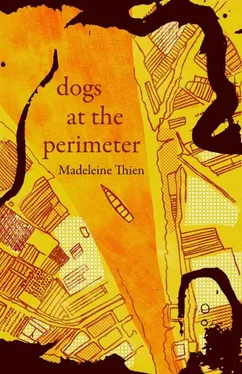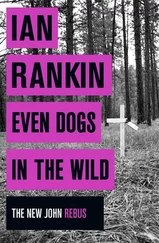He covers his face with his hands.
The thing is, a part of him wants to remain in Phnom Penh. The jungle eats the buildings up, and the people come and push it back, and violence isn’t hidden anywhere, it just is what it is, it dogs you like the river, it arrives and returns, it arrives and remains.
He tells James, “I won’t abandon you.”
“You’ll never be ready,” his brother says impatiently. “You never had it in you.”
The rains start. He’s ashamed to witness such hardship. People cling to nothing, they stare out with empty expressions, a blankness that seems like a screwed-on lid, slowly cracking under the pressure. Meanwhile, he goes back, every night, to the Hotel Samaki, where a three-course dinner is served on fragile painted plates. The food in the hotel is fresh and bountiful, the Red Cross has its own private stock of food. He’s never eaten so well in his life. The sound of the metal forks raking against the plates disturbs him. He wants to pray or meditate or walk on water. Stories pile up in his black notebook: the Japanese cameraman who was captured in 1973 and killed. The Canadian sailor who washed up on the south coast in 1977, he was imprisoned and finally executed. All the children who, orphaned or separated, flew away to the other side of the world.
At the hotel, he stands, drenched, under the once-sublime balustrade. The water carries lost objects, a rubber sandal, a baby’s tub. A boy races to retrieve usable items, the water rising as high as his waist. Thirty years later, Hiroji thinks he sees him again, the very same child, except that this one is shouting, pursued by another boy, and the street is a current of reflected colours, headlights, and neon signs rubbing the darkness. Phnom Penh is under water again, but this time it is strange and out of season. Nuong snaps and unsnaps his cell phone, extends an umbrella, and guides Hiroji through the rivered streets to Nuong’s own guesthouse, the Lowell Hotel. A young helper lifts Hiroji’s suitcase, frowns, tells Nuong that this Korean tourist has come empty-handed. Hiroji stands like a potted plant, gazing at Nuong’s wife, she is fine-boned and lovely, her flower-patterned dress quivering in the fan’s current. “A twenty-hour flight!” Nuong is saying. “Just one more set of stairs.” They go up and up. Behind them, the helper, Tarek, balances the suitcase on his shoulder. “The best room,” he hears, “you can stay as long as you want,” and it is comfortable, cool and sun-dappled. Nuong aims a remote at the ceiling and the air conditioning clanks into life. “Relax for an hour or so, then we’ll go to dinner. The rains will stop. There’s a great place …” and Hiroji sits on the bed. There is the bodhisattva just as it was, one hand pointing to heaven, the other caressing the earth. “It’s yours,” Nuong is saying. “Do you remember? You gave it to me at the airport, before I boarded the plane. I’ve always kept it.” When the door closes, Hiroji stands for a long time at the window, trying to understand the choice he’s made, the things he’s done. There’s no going home now. Some part of him is still in the airplane, still looking down, unable to see.
Three weeks went by and he travelled from one edge of the country to the other. Sometimes Nuong accompanied him, but usually Hiroji went with Tarek. They went by car or motorbike, they spent days away from Phnom Penh. First stop, the Dangrek Mountains, Sisophon, the narrow road to the Thai border. Turning east again, to Kampong Thom, then crisscrossing southwest. He thought he could go forever, towns giving way to villages, giving way to lone shacks. Hiroji carried the same black notebook he had used in 1979. It was the hot season. Sometimes he and Tarek sat for hours, waiting for the sun to retreat. Tarek grinned helplessly at the ladies, they were a pink-or blue-or violet-shirted flock of swans, arranged on hammocks. Hiroji saw James everywhere, in the old men resting their elbows on plastic tables, sitting astride their motorbikes. Monks hurried by, bright along the road like autumn leaves.
When he had been in Cambodia nearly a month, Nuong introduced him to Bonny. He was a fixer, a survivor who had made a living digging up the dead. In the bar where they met, he wore a loud, disco-era shirt, sunglasses up on his forehead, and a drooping frangipani behind his ear. Men like Bonny, Nuong said, were Cambodia’s secret service. Usually, they were former Khmer Rouge, disbanded in the mid-1990s when the coalition government fell apart, who had since reinvented themselves as private detectives. They had taken foreign journalists to Pol Pot, to Comrade Duch, and Ta Mok. “Everyone is my friend,” Bonny told him. He had the most piercing eyes Hiroji had ever seen. “From the cave-dwellers to the politicians to the cia. Now you,” he said, sliding his mirrored sunglasses down, “you are my friend.” Hiroji gazed into the double reflection of himself, the restaurant, the beer girls behind them.
He paid Bonny in American dollars. A few weeks later, at the height of the dry season, the fixer knocked on Hiroji’s door.
He entered the room in a calico shirt. In his hand, he brandished a dozen photographs. “Didn’t I tell you?” he said, smiling his sunlit smile. “Bonny can work miracles.”
He lay the photographs on the bedspread. Hiroji stood and stared. The face in the picture was older, lined, and achingly familiar. He saw his mother’s eyes. Bonny was speaking and Hiroji had to shade his face, block the man’s grin, in order to comprehend. James was living under a false name, Bonny said. Kwan . A decade ago, he had moved to northern Laos, and he lived there with a woman and her grown children. The woman was Laotian but had lived in Cambodia nearly all her life. Vanna .
“Look,” Bonny said. “I even bought you an airplane ticket. You leave tomorrow for Luang Prabang.” He tapped his chest with the open flat of his hand. “Courtesy of Bonny.”
Hiroji felt nothing.
This was the initial fist of shock.
“Your brother is alive,” Bonny said. Grave, sympathetic.
That night, Hiroji and Nuong went to a bar on the riverside. The walls sang with tropical light. The foreigners were loud and drunk but Hiroji, unbearably sober, remembered his mother who had died two decades ago. He thought of all the ways he had abandoned James little by little, year by year. By the time he moved to Montreal, he had given up returning to the Thai border and to Cambodia. Nuong ordered a round of drinks. Outside, moto drivers slept on the seats of their vehicles, their bare feet balanced on the handlebars. Hiroji drank beer and then whiskey and then beer again. Beside him, the waitress played with the sleeve of her uniform, staring at the clients as if they were images on a television screen. He told Nuong that he was ready to leave his brother behind. “Yes,” Nuong said, not meeting his eyes. Why was it that forgetting James was like cutting off his hand, but his brother had chosen to live an entire life away from them? Could they possibly still be brothers? If so, it couldn’t mean anything. Tomorrow he would go home to Canada. He would explain his disappearance as a fugue state, an amnesia that carries a person away for weeks, even months. He would return and throw himself into his work, already new ideas and research projects were taking root in his mind. He would accept that he had been the only one looking, it was his own guilt that had driven him here. The whiskey softened his thoughts. He was a good researcher, a good man. He had let his mother down but, still, it was no reason for weeping.
“Come on,” Nuong said. “Let’s go to the river. Let’s get out of here and see the city.”
Hiroji arrived in Luang Prabang the next afternoon and hired a driver to take him to James’s village. In the road, children came and swirled around him, they called him farang Hmong, he gave them candy and they flew off like summer birds. He followed the directions that Bonny had given him. He went up to the house, unsure whether to knock or push the door open, he had the uneasy sensation that it was himself he would see, as if all the lying and forging of documents had finally caught up to him. He knocked and eventually an old man opened the door, an old man who looked just like the photographs of their father, a father Hiroji could barely recall.
Читать дальше












